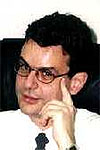(Napoleon Bonaparte, "Thoughts")
"They may all e called Heroes, in as much as they have derived their purposes and their vocation not from the calm regular course of things, sanctioned by the existing order, but from a concealed fount, from that inner Spirit, still hidden beneath the surface, which impinges on the outer world as a shell and bursts it into pieces - such were Alexander, Caesar, Napoleon ... World-historical men - the Heroes of an epoch - must therefore be recognized as its clear-sighted ones: their deeds, their words are the best of their time ... Moral claims which are irrelevant must not be brought into collision with World-historical deeds ... So mighty a form must trample down many an innocent flower - crush to pieces many an object in its path."
(G.W.F. Hegel, "Lectures on the Philosophy of History")
In all great deceivers a remarkable process is at work to which they owe their power. In the very act of deception with all its preparations, the dreadful voice, expression, and gestures, they are overcome by their belief in themselves; it is this belief which then speaks, so persuasively, so miracle-like, to the audience."
(Friedrich Nietzsche, "The Genealogy of Morals")
"He knows not how to rule a kingdom, that cannot manage a province; nor can he wield a province, that cannot order a city; nor he order a city, that knows not how to regulate a village; nor he a village, that cannot guide a family; nor can that man govern well a family that knows not how to govern himself; neither can any govern himself unless his reason be lord, will and appetite her vassals; nor can reason rule unless herself be ruled by God, and be obedient to Him."
(Hugo Grotius)
The narcissistic leader is the culmination and reification of his period, culture, and civilization. He is likely to rise to prominence in narcissistic societies.
The malignant narcissist invents and then projects a false, fictitious, self for the world to fear, or to admire. He maintains a tenuous grasp on reality to start with and this is further exacerbated by the trappings of power. The narcissist's grandiose self-delusions and fantasies of omnipotence and omniscience are supported by real life authority and the narcissist's predilection to surround himself with obsequious sycophants.
The narcissist's personality is so precariously balanced that he cannot tolerate even a hint of criticism and disagreement. Most narcissists are paranoid and suffer from ideas of reference (the delusion that they are being mocked or discussed when they are not). Thus, narcissists often regard themselves as "victims of persecution".
The narcissistic leader fosters and encourages a personality cult with all the hallmarks of an institutional religion: priesthood, rites, rituals, temples, worship, catechism, mythology. The leader is this religion's ascetic saint. He monastically denies himself earthly pleasures (or so he claims) in order to be able to dedicate himself fully to his calling.
The narcissistic leader is a monstrously inverted Jesus, sacrificing his life and denying himself so that his people - or humanity at large - should benefit. By surpassing and suppressing his humanity, the narcissistic leader became a distorted version of Nietzsche's "superman".
But being a-human or super-human also means being a-sexual and a-moral.
In this restricted sense, narcissistic leaders are post-modernist and moral relativists. They project to the masses an androgynous figure and enhance it by engendering the adoration of nudity and all things "natural" - or by strongly repressing these feelings. But what they refer to as "nature" is not natural at all.
(Note: You can view every article as one long page if you sign up as an Advocate Member, or higher).




